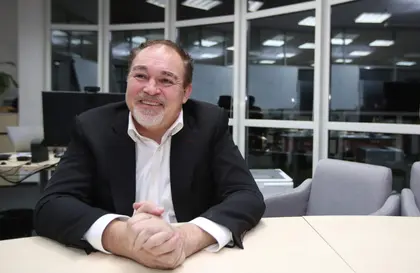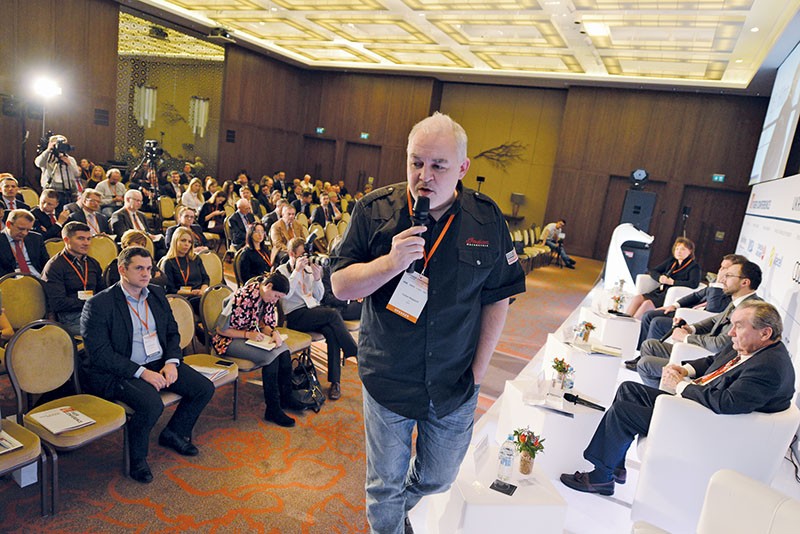After coming to Ukraine in 1998, Danish native Torben Majgaard quickly went from selling second-hand computers in his 20s to creating Ciklum, one of the nation’s five largest information technology outsourcing companies, in 2002.
His success as a gregarious salesman and skilled entrepreneur inspired countless people and made him a multimillionaire. He gave generously to many causes, studied history and liked to help his friends and make them happy.
JOIN US ON TELEGRAM
Follow our coverage of the war on the @Kyivpost_official.
But he suffered from alcoholism and died on Jan. 3 in a hospital in Marbella, Spain, at the age of 48 from cirrhosis of the liver.
At the end, his longtime friend, Karl Robb, stood vigil at his hospital bedside to witness an unconscious Majgaard’s last hours of life. Majgaard’s mother and sister also made the trip to Spain from Denmark and were at his bedside when he died. The next day, Robb went to the crematorium at Marbella’s San Bernabe Cemetery to collect his ashes.
His wife, Tanya, the Ukrainian mother of his three children — ages 3 to 11 – also came from Ukraine, but didn’t arrive before his death. She remains in Spain and will return to Kyiv with an urn carrying his ashes when she has the necessary legal documents.
A memorial service is planned in Kyiv on Jan. 19, but the location has not yet been set yet, according to another close friend, fellow Dane Nicolai Kollner, who lives in Kyiv.
“It is depressing,” Robb, a retired executive of EPAM, one of Ciklum’s IT competitors, told the Kyiv Post in a telephone interview on Jan. 6, as he pondered the lessons of Majgaard’s life.
“Be ambitious. Take risks. Try to control your dark side. Don’t lie to yourself,” Robb said. “He was a guy who took risks and became successful. He created a globally successful company on his own in a very competitive industry. He built an organization that attracted world-class customers and provided employment opportunities for 2,500-3,000 people.”
And, despite his untimely death, Majgaard “still lived more than the vast majority of people ever do,” Robb said. “Torben was an optimist and cerebral investor. He invested in many failed ventures but was still willing to invest sizeable sums in the dreams of other aspiring entrepreneurs. His failures never discouraged him from trying again. That attitude led him to found Ciklum and his immense success in creating an industry giant that’s a credit to him and to Ukraine.”
Not only did he leave Ciklum with a great future, “his children will be set for life,” Robb said. At the time of his death, Majgaard owned half of Ciklum with the billionaire philanthropist George Soros owning the other half, he said. It is one of the five largest IT outsourcing firms in Ukraine, along with EPAM, Softserve, Global Logic, and Luxoft.
Hard talk on health
Even though their friendship went back almost two decades, Robb and Majgaard had a falling out about 10 months ago, the last time that Robb talked to him. Robb decided to break off ties until Majgaard changed his lifestyle and got healthy again. “I had this conversation with him for the last four years: a serious conversation about his health six or seven times, face to face.” Robb and his wife invited Majgaard to stay with them in Spain. Not only did Majgaard refuse, “he denied the problem existed.”
Kollner, the Danish friend who met Majgaard on his first day in Ukraine in 2005, never broke off ties as Robb did. But he witnessed the same issues, dating from 2013. “It was terrible, terrible to watch,” he said. “He didn’t want to realize how much trouble he was in and what he was doing to himself. He even denied the obvious.”
It’s all the more tragic because “he created this amazing company,” Kollner said. “He made this community of colleagues and we would have gatherings in Kyiv, with him always in the center. He was a great guy to be with. He brought a lot of people together, a lot of people who wouldn’t be here without him.”
History buff
In 2013, Kollner and three other Danish friends accompanied Majgaard to Gettysburg, Pennsylvania, for the 150th-anniversary commemorations of the key U.S. Civil War battle. “We joined the 21st Georgia Infantry Company and lived like a Confederate soldier for five days.”
Majgaard “was a total history buff,” who loved to watch the History Channel and read about everything, whether it was Roman, Viking or World War II history, Kollner said.
In a 2017 interview with the Kyiv Post, Majgaard boasted about his vast historical knowledge: “I’m always ready to challenge people on their own history, no matter from which country they came.” He could talk on various historical events at length.
Ciklum’s statement
Ciklum’s statement about Majgaard’s death summarized his career this way:
“Torben founded Ciklum in 2002, opening Ciklum’s first development center in Kyiv, Ukraine. Under his leadership Ciklum grew to become a global digital solutions company for Fortune 500 and fast-growing organizations, bringing together 3,500+ developers across the globe, with software development centers and branch offices in the United Kingdom, United States, Spain, Switzerland, Denmark, Israel, Poland, Ukraine, Belarus, and Pakistan. Torben was committed to our clients, employees, and communities. And we will honor his legacy by dedicating ourselves to continuing the work he started, focusing on customers, delivering leading-edge solutions and bringing amazing ideas to life.”
Philanthropic investor
Besides Ciklum, Majgaard also was a founder of the BrainBasket Foundation to spread IT education across Ukraine.
Majgaard backed the Ukrainian Venture Capital and Private Equity Association, chaired by his friend, Andrey Kolodyuk, who wrote in a Facebook post after Majgaard’s death: “He was a great believer in Ukraine. We all should admire and respect him for this.”
Ciklum was also a driving force and financial backer of the first Ukraine Davos House in 2018, which took place on the sidelines of the World Economic Forum in Switzerland, with the aim of promoting investment opportunities in Ukraine.
Ciklum has also donated since 2015 to the Kyiv Post’s IT fellowship, enabling the newspaper to hire a full-time beat reporter, a position now filled by Denys Krasnikov, to cover the sector.
Majgaard was also a featured speaker at two of the seven annual Kyiv Post Tiger Conferences. At the first event in 2012, he also sponsored a VIP reception for then-Georgian President Mikheil Saakashvili, who gave the keynote address with then-Economy Minister Petro Poroshenko at the inaugural conference. He also spoke at the 2016 event and, in 2017, he presented a Top 30 Under 30 Award to Daria Leshchenko, CEO of SupportYourApp.
‘A great leader’
He spent his last years traveling widely between Ukraine, England, Spain, the United States, his native Denmark and other countries, working on new ventures.
“He loved Spain because he loved the sun,” Marina Vyshegorodskikh, who worked as a senior manager of Ciklum for 12 years, said of the country where he died. “He always wanted to be in the sun.”
Vyshegorodskikh called him ” a great leader with his own, unique vision and principles. He was a person for whom there was nothing impossible; a human with a huge heart, endless energy and endless trust in people…I feel blessed to have this chance in life.”
She worked with Majgaard from 2005 to 2017, when Majgaard moved from CEO to executive chairman. Since August 2017, Michael Boustridge has been Ciklum’s CEO and president.
“It was impossible not to follow him,” she said of Majgaard’s leadership. “I think he wanted to be remembered as a man of principles — trust, respect and leading by example.”
Kyiv Post interviews
In two interviews with the Kyiv Post, one published on Jan. 24, 2013, and a second one published on Dec. 22, 2017, Majgaard shared his business philosophy, including his tip for succeeding in Ukraine: “Don’t take ‘no’ for an answer.”
At the time, in 2013, Majgaard owned 80 percent of Ciklum with Horizon Capital, a private equity fund manager, holding the other 20 percent. In 2015, Soros bought an equity stake in the company with more than 2,500 employees, six offices in Ukraine, and 13 offices abroad.
In Kyiv, Ciklum operates from two business centers — Horizon Park and Gulliver. It announced revenues of $100 million in 2012, but has since stopped publicly disclosing financial information.
When Majgaard came to Ukraine in 1998 to sell second-hand computers, “I fell a little bit in love with things over here,” he told the Kyiv Post from his 19th-floor office at Horizon Park. “It was a world you could influence and change, especially for a kid in his early 20s, coming from overregulated Denmark.”
But by 2001, Ukraine’s legendary corruption forced him to change course. “I was getting tired of the people who demanded bribes to allow my chain to continue operating as usual.” He sold his business for $10,000 and bought a Kyiv apartment, converting from hardware to software sales with Ciklum’s 2002 start.
The success of Ciklum, he said, is that “our customers don’t see us as a quick fix. They see us as a long-term partner.” Denis Tafintsev, then with Horizon Capital, said the investment firm bought a 20 percent stake in Ciklum because “it’s got a unique business model and a strong management team and will continue to grow quicker than the market itself. Torben is a very energetic and exciting entrepreneur.”
Even before starting the BrainBasket Foundation in 2014, Majgaard was thinking about ways to improve IT education in Ukraine. “In reality, the schools are of poor quality,” he said. “The universities are not that good and need to have a closer connection with industry needs.”
He was also not happy with the business climate a year before the EuroMaidan Revolution toppled Kremlin-backed President Viktor Yanukovych.
“I really haven’t seen things improve a lot, unfortunately,” Majgaard said. “I’m also not fantastically optimistic about how things are going to improve in the near future.”
His views hadn’t changed much in the 2017 interview when he blamed Ukrainian politicians and their oligarch backers for stifling Ukraine’s development with corrupt and uncompetitive practices.
Big faith in IT
But he never lost his faith in the IT sector, which he saw as the key to economic growth and modernization in Ukraine. The sector accounts for at least 3 percent of Ukraine’s $120 billion annual gross domestic product, a share that is expected to increase rapidly.
“No matter what happens around, IT is free,” Majgaard told the Kyiv Post. “All you need is an office, connection to the internet, ability to code and here we go — you’ve got an IT company that can do business internationally. There’s nothing to hold this industry back — no barriers, except people’s own brains.”
As someone who came from Denmark, one of the world’s least corrupt countries, to Ukraine, one of the more corrupt ones, he also believed that going digital was the key to solving the problem. “Bribing is not possible if the government institutions and their services become electronic,” he said.
But he also counseled patience.
“Ukraine’s a large country with a long history. You don’t turn around a country like that in a year or two. Reforms do happen, but I understand people who say they’re happening too slow.”
You can also highlight the text and press Ctrl + Enter










